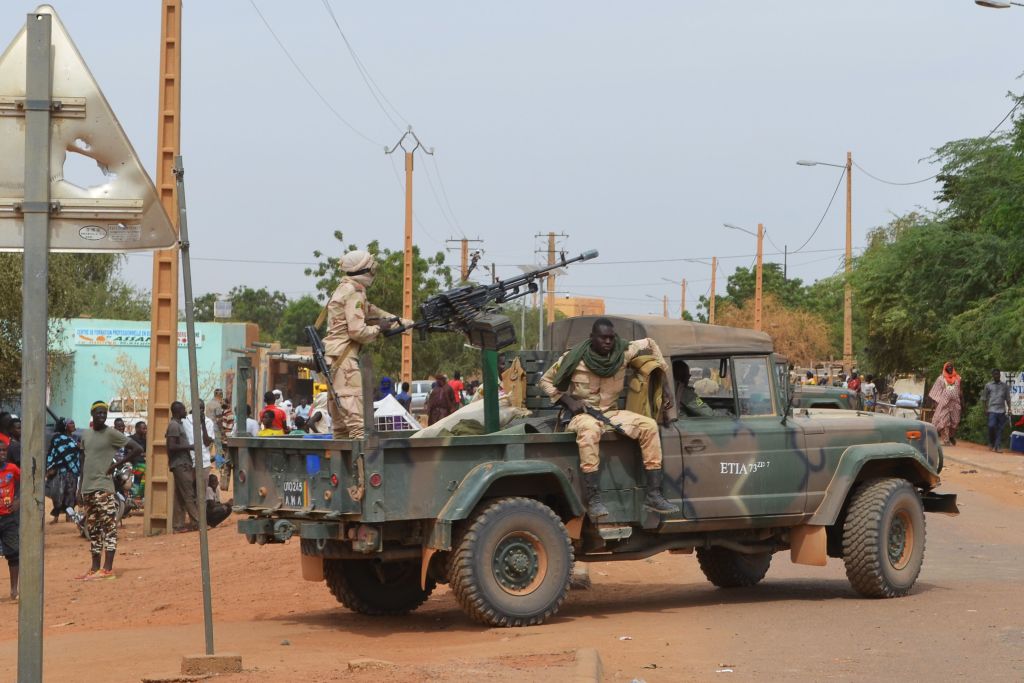At a market in the town of Sébabougou, in a part of western Mali that has been contested by terrorists for years, the Army and its Russian mercenary partners on April 12 arrested 100 men, mostly ethnic Fulani, and took 60 of them to an undisclosed location.
More than a week later, having received no information, relatives went looking for their loved ones and discovered dozens of bodies near a Malian Armed Forces base 31 kilometers away.
“They were all in an advanced state of decomposition, which makes their identification very difficult,” a witness told Radio France Internationale. “You really have to be close to the individual to recognize them. Either by their clothes or by their shoes. … Otherwise, through the body, it’s impossible. Some bodies remain tied up even after they have decomposed.”
United Nations experts expressed outrage and called for a prompt investigation.
“According to unconfirmed reports, those arrested were tortured and interrogated about alleged links with ‘terrorists’ at the Kwala military camp,” the experts said on April 30. “The victims were reportedly whipped during interrogation. Afterwards, military and security personnel recruited by the Wagner Group reportedly took the victims out of the camp and executed them by opening fire.”
Massacres, summary executions and enforced disappearances have become all too common since Mali’s junta brought in notorious Russian Wagner Group mercenaries to help fight multiple insurgencies, including the al-Qaida-backed Jama’at Nusrat al-Islam wal-Muslimin and the Islamic State affiliate, IS-Sahel.
Experts say Russian mercenaries in Mali have expanded their scope of operations at the cost of civilian lives and tell of entire communities razed, women strip-searched and abused, men decapitated, and people burned alive.
After the death of Wagner founder Yevgeny Prigozhin in 2023, the Russian Ministry of Defense took over and rebranded the group’s operations on the continent as Africa Corps. But in Mali, the fighters have continued to identify themselves as “Wagner,” according to analysts who monitor their Telegram channels.
In the last quarter of 2023, after Russia took over the group, Wagner’s activities in Mali doubled compared with the previous quarter, according to analysis by conflict monitor ACLED. The trend continued in 2024, when armed groups killed about 400 people, while Wagner and Malian forces killed more than 900 people, ACLED said.
In a December 2024 report, Human Rights Watch revealed that between May and December of that year, the Malian Army and Russian forces “deliberately killed at least 32 civilians, including 7 in a drone strike, forcibly disappeared 4 others, and burned at least 100 homes in military operations in towns and villages in central and northern Mali.”
Some experts believe the increased violence stems from the junta’s need to show progress against armed groups, but its long-term impact is harming the people the government needs to win over in order to establish regional peace.
Constantin Gouvy, a Sahel researcher with the Clingendael Institute, described “Wagner’s callous strategy [as] characterized by wanton violence against civilians.”
“For now, it’s reasonable to expect Russia will continue to leverage Wagner and Africa Corps to spread its influence in the Sahel in one form or another,” he told Al Jazeera.
In April, the U.N. experts stressed that countries have an international legal obligation to conduct effective investigations and ensure accountability and effective remedies for human rights violations.
“We are deeply troubled by the apparent total impunity and lack of prosecution or prevention of these violations attributed to both Malian defense and security forces, and foreign military and security personnel from the ‘Wagner’ Group and/or ‘Africa Corps’,” the experts said. “Failure to bring alleged perpetrators of human rights violations to justice could undermine public confidence in the armed forces and be exploited by violent extremist groups.”
Under the U.N. Global Counterterrorism Strategy, governments must address the root causes of violence, such as prolonged unresolved conflicts, weak rule of law, human rights violations, impunity, discrimination and poor governance.
“These unlawful killings may amount to war crimes, and that the enforced disappearances may constitute crimes against humanity if they are part of widespread or systematic attacks against civilians,” the U.N. said. “State failure to investigate constitutes in itself a violation of the right to life.
“Those responsible for unlawful killings and enforced disappearances, whether by direct involvement or complicity, must be prosecuted, and measures must be taken to prevent their recurrence and provide reparation to the victims.”

